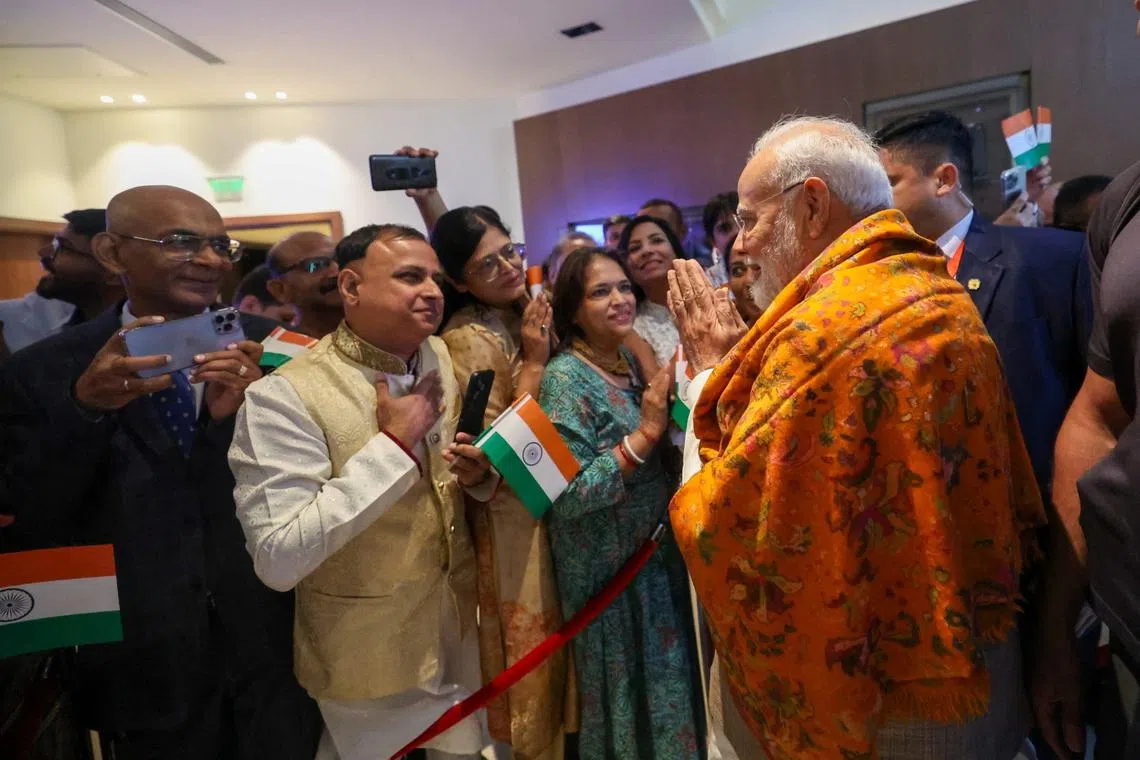India’s Modi urges Zelensky to sit down for talks with Russia
Sign up now: Get ST's newsletters delivered to your inbox

India's Prime Minister Narendra Modi is greeted by members of the Indian community as he visits Kyiv, on Aug 23.
PHOTO: REUTERS
KYIV – India’s Narendra Modi urged President Volodymyr Zelensky on Aug 23 to sit down for talks with Russia to end the war in Ukraine and offered to act as a friend to help bring peace as the two leaders met in wartime Kyiv.
The first visit by an Indian prime minister in modern Ukrainian history comes at a volatile juncture in the war in Ukraine, with Ukrainian forces still in Russia’s western Kursk region following their incursion on Aug 6
The visit follows a trip by Mr Modi to Moscow in July. He
“The road to resolution can only be found through dialogue and diplomacy, and we should move in that direction without wasting any time. Both sides should sit together to find a way out of this crisis,” Mr Modi said.
“I want to assure you that India is ready to play an active role in any efforts towards peace. If I can play any role in this personally, I will do that, I want to assure you as a friend.”
The remarks were made during joint statements, in which both leaders hailed the visit as “historic”.
Mr Modi spoke second, and Mr Zelensky did not have an opportunity to respond to the call for dialogue.
But the Ukrainian leader said in his remarks that “the matter of ending the war and a just peace are the priority for Ukraine”.
Mr Modi’s visit to Moscow in July coincided with a heavy Russian missile strike on Ukraine that hit a children’s hospital. The attack prompted Mr Modi to use emotive language to deliver an implicit rebuke to Russian President Vladimir Putin during their summit.
But the trip elicited fierce criticism from Mr Zelensky, who said it was a “huge disappointment and a devastating blow to peace efforts to see the leader of the world’s largest democracy hug the world’s most bloody criminal in Moscow on such a day”.
Mr Mykhailo Podolyak, an adviser in the Ukrainian president's office, told Reuters that Mr Modi's visit to Kyiv was significant because New Delhi "really has a certain influence" over Moscow.
“It is extremely important for us to effectively build relations with such countries, to explain to them what the correct end to the war is – and that it is also in their interests,” he said.
India, which has traditionally had close economic and defence ties with Moscow, has publicly criticised the deaths of innocent people in the war.
But it has also strengthened its economic ties with Moscow after Western nations imposed sanctions on Russia and cut trade relations with it over the invasion.
Indian refiners, which rarely bought Russian oil in the past, have emerged as Moscow’s top clients for sea-borne oil since Russia poured troops into Ukraine in February 2022. Russian oil accounts for over two-fifths of India’s oil imports.
Peace vision
Ukraine has said it hopes to bring together a second international summit later in 2024 to advance its vision of peace that would involve representatives from Russia.
The first summit in Switzerland that pointedly excluded Russia in June attracted scores of delegations, including one from India, but not from China, the world's second-largest economy.
“Lasting peace can only be achieved through options that are acceptable to both parties, and it can only be a negotiated settlement,” Mr Tanmaya Lal, Secretary (West) in the Indian Foreign Ministry, told reporters.
“This is an important visit that is expected to catalyse our ties in a whole range of sectors,” Mr Lal said, listing economic and business links, agriculture, infrastructure, health and education, pharmaceuticals, defence, and culture.
Mr Volodymyr Fesenko, a Kyiv-based political analyst, said he expected no breakthrough proposals to be made to end the war during Mr Modi’s trip, which followed his visit to Poland on Aug 22
For there to be an attempt to negotiate, the military situation has to stabilise, and the presidential election in the US must have concluded, he said.
He said the visit was important for India to demonstrate it was “not on Russia’s side” and that Kyiv wanted to normalise relations after Mr Modi’s trip to Moscow. REUTERS


